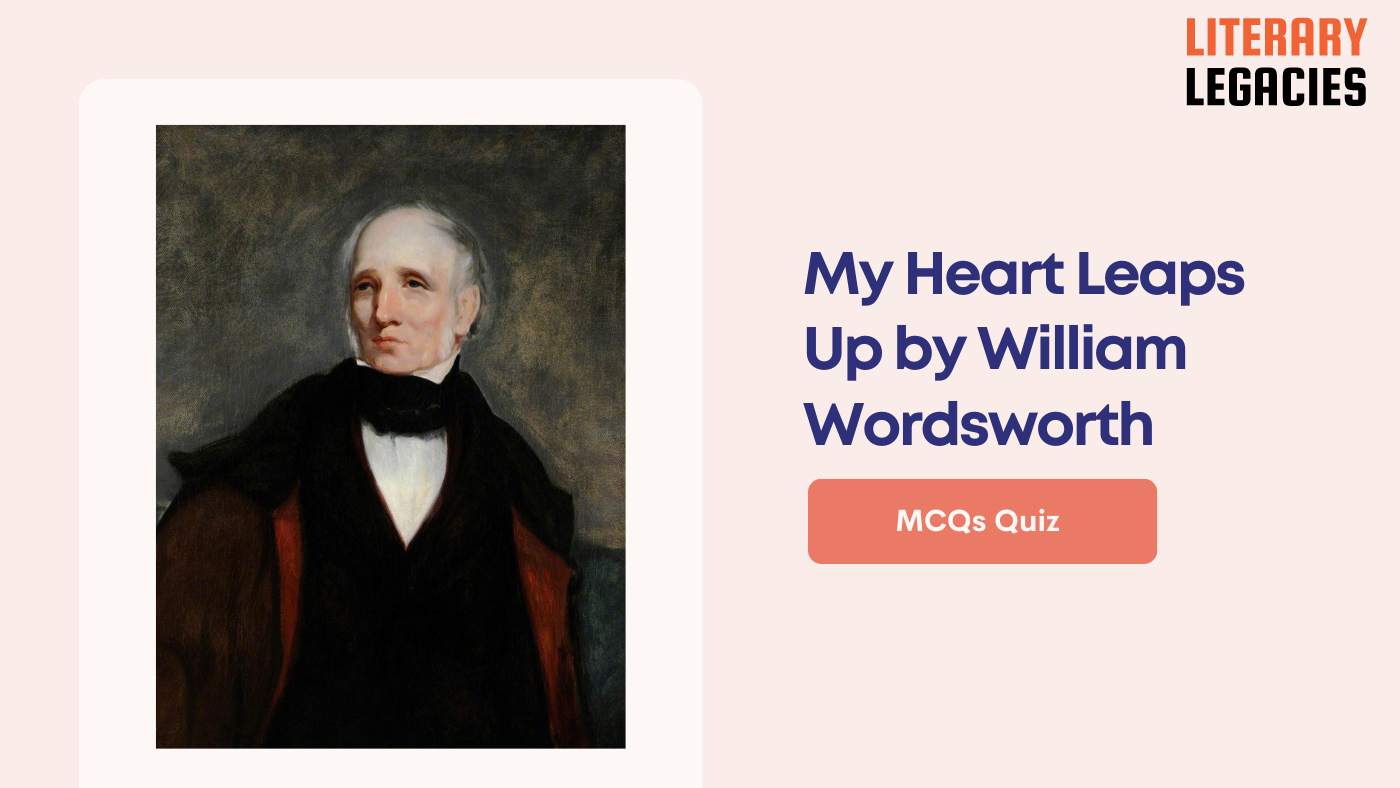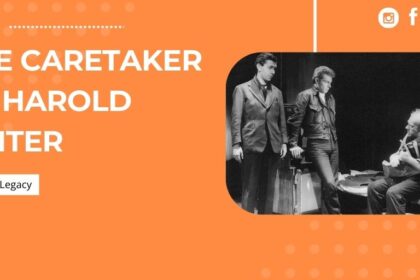1. Where was William Wordsworth staying when he wrote ‘My Heart Leaps Up’?
A. A hotel in Manchester
B. Dove Cottage in Grasmere
C. A friend’s house in Oxford
D. Dove Cottage in London
Answer: Dove Cottage in Grasmere (B)
Dove Cottage was Wordsworth’s home in Grasmere at the time.
2. What is the alternative title of the poem ‘My Heart Leaps Up’?
A. The Heart of Poetry
B. The Rainbow
C. The Joy of Nature
D. The Beauty of the Sky
Answer: The Rainbow (B)
The poem is also known as ‘The Rainbow’.
3. What was published in 1807?
A. Wordsworth’s biography
B. A book of Wordsworth’s essays
C. Poems, in Two Volumes
D. A collection of Wordsworth’s letters
Answer: Poems, in Two Volumes (C)
The poem was first published in Poems, in Two Volumes in 1807.
4. What did Wordsworth begin writing the day after he wrote ‘My Heart Leaps Up’?
A. A novel about his childhood
B. A new poem about a rainbow
C. Ode: Intimations of Immortality
D. A letter to his sister
Answer: Ode: Intimations of Immortality (C)
The day after writing ‘My Heart Leaps Up’, Wordsworth began to write his more ambitious ‘Ode: Intimations of Immortality’.
5. What is the significance of the last three lines of ‘My Heart Leaps Up’?
A. They are the most joyful lines in the poem
B. They are the most difficult lines to understand
C. They are used as part of the epigraph to ‘Ode: Intimations of Immortality’
D. They are a summary of the entire poem
Answer: They are used as part of the epigraph to ‘Ode: Intimations of Immortality’ (C)
The last three lines of ‘My Heart Leaps Up’ are used as part of the epigraph to ‘Ode: Intimations of Immortality’.
6. What is one interpretation of why Wordsworth felt joy when viewing the rainbow?
A. Because it reminded him of his childhood
B. Because it symbolized a covenant with nature
C. Because it was a beautiful sight
D. Because it was a rare occurrence
Answer: Because it symbolized a covenant with nature (B)
Some commentators have speculated that Wordsworth felt such joy because the rainbow indicates the constancy of his connection to nature.
7. What biblical reference is made in the analysis of the poem?
A. The story of Psalm 23
B. The story of Genesis 6:9–11:32
C. The story of Matthew 5:3–12
D. The story of Exodus 20:1–17
Answer: The story of Genesis 6:9–11:32 (B)
Some literary analysis draws parallels to the rainbow of Noah, and the covenant it symbolized, as described in Genesis 6:9–11:32.
8. What does the rainbow symbolize to Noah according to Harold Bloom?
A. The survival of his poetic gift
B. The beauty of nature
C. The survival of mankind
D. The power of imagination
Answer: The survival of mankind (C)
Harold Bloom suggests that the rainbow symbolizes the survival of mankind, just as it does in the biblical story of Noah.
9. What is William Blake’s criticism of Wordsworth’s phrase ‘natural piety’?
A. It is too vague
B. It is too poetic
C. It is too long
D. It is self-contradictory
Answer: It is self-contradictory (D)
Blake believed that man was naturally impious, and therefore Wordsworth’s phrase contradicts itself.
10. What shape is the rainbow, according to Fred Blick’s speculation?
A. A square
B. A triangle
C. A circle
D. An arc of a circle
Answer: An arc of a circle (D)
Fred Blick speculates that the word ‘piety’ at the end of the last line is a deliberate geometrical pun, signaled by the phrase ‘bound each to each’.
11. What is the significance of the word ‘piety’ according to Fred Blick’s speculation?
A. It symbolizes beauty
B. It symbolizes creativity
C. It symbolizes power
D. It symbolizes continuity
Answer: It symbolizes continuity (D)
Fred Blick speculates that the word ‘piety’ at the end of the last line is a deliberate geometrical pun, signaled by the phrase ‘bound each to each’, and thus symbolizes continuity.
12. What is Harold Bloom’s interpretation of Wordsworth’s poetic gift?
A. It relies on his ability to imagine the future
B. It relies on his ability to write poetry
C. It relies on his ability to observe nature
D. It relies on his ability to recall memories of his joy as a child
Answer: It relies on his ability to recall memories of his joy as a child (D)
Harold Bloom suggests that Wordsworth’s poetic gift relies on his ability to recall the memories of his joy as a child.
13. What is a characteristic of Wordsworth that is mentioned in the poem?
A. He was a skilled mathematician
B. He loved geometry
C. He hated poetry
D. He was a natural pessimist
Answer: He loved geometry (B)
Wordsworth loved geometry and may have been making the same pun on ‘piety’ when he used the word at least twice elsewhere.
14. What is the tone of William Blake’s criticism of Wordsworth’s phrase ‘natural piety’?
A. Critical
B. Playful
C. Admiring
D. Neutral
Answer: Critical (A)
Blake’s criticism of Wordsworth’s phrase is a negative one, as he believes that man was naturally impious, and therefore Wordsworth’s phrase contradicts itself.
15. What does the paradox ‘The Child is the Father of The Man’ imply?
A. Every child of the present is a potential father for the future
B. Manhood is the past of a child
C. Infancy is the future of a child
D. A person can become a father without becoming a child first
Answer: Every child of the present is a potential father for the future (A)
This paradox is used in the seventh line of the poem to convey a deeper meaning.
16. What is the main theme of the poem ‘My Heart Leaps Up When I Behold’?
A. The significance of manhood
B. The importance of nutritious food in childhood
C. The poet’s feelings of joy and happiness in childhood
D. The beauty of nature
Answer: The poet’s feelings of joy and happiness in childhood (C)
The poem is a reflection of the poet’s feelings when reminded of his childhood.
17. According to the poem, what is the relationship between nature and man?
A. Man and nature are separate entities
B. Man is a product of nature
C. Man is the ruler of nature
D. Nature is a product of man
Answer: Man is a product of nature (B)
The poem highlights the connection between nature and human life.
18. What does the poet’s childhood experience signify?
A. The role of infancy in shaping future
B. The importance of love and care in childhood
C. The influence of nature on human life
D. The significance of nutritious food in childhood
Answer: The importance of love and care in childhood (B)
The poem emphasizes the importance of childhood experiences in shaping one’s life.
19. What is the outcome of proper care and nourishment in childhood?
A. A person who is unhappy and discontent
B. A healthy and self-dependent citizen
C. A person who is disconnected from nature
D. A person who is stuck in childhood
Answer: A healthy and self-dependent citizen (B)
The poem suggests that proper care and nourishment lead to a healthy and self-sufficient individual.
20. What is implied by the phrase ‘The Child is the Father of The Man’?
A. The present determines the future
B. Childhood is separate from manhood
C. Manhood is the same as childhood
D. The past determines the present
Answer: The present determines the future (A)
The paradox highlights the connection between the present and the future.
21. What is the significance of the poem’s theme?
A. It highlights the importance of nature in human life
B. It shows the connection between the present and the future
C. It illustrates the importance of manhood
D. It emphasizes the role of childhood in shaping one’s future
Answer: It shows the connection between the present and the future (B)
The poem explores the connection between the present and the future.
22. What is the poet’s perspective on the relationship between nature and human life?
A. Nature and human life are interconnected
B. Nature determines human life
C. Human life determines nature
D. Nature is separate from human life
Answer: Nature and human life are interconnected (A)
The poem suggests that nature and human life are closely connected.
23. What is the outcome of the poet’s reflection on his childhood?
A. He becomes disconnected from nature
B. He feels unhappy and discontent
C. He becomes stuck in childhood
D. He feels a sense of joy and happiness
Answer: He feels a sense of joy and happiness (D)
The poem is a reflection of the poet’s happy feelings when reminded of his childhood.
24. What is the poet’s view on the role of childhood in human life?
A. Childhood shapes one’s future
B. Childhood is the same as manhood
C. Childhood is a separate stage of human life
D. Childhood is insignificant in human life
Answer: Childhood shapes one’s future (A)
The poem highlights the significance of childhood in shaping one’s life.



